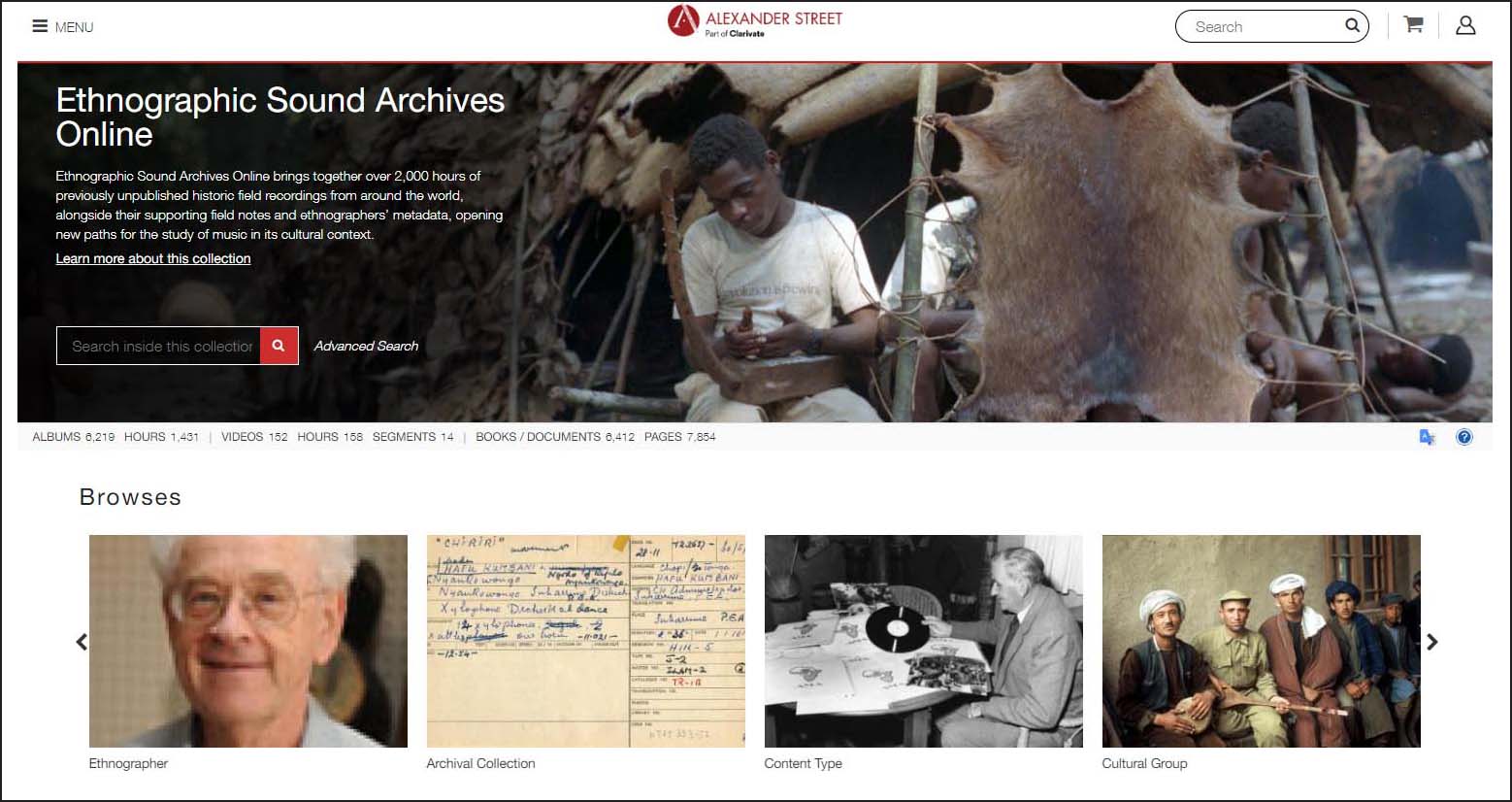Ethnographic Sound Archives Online | eReview
ProQuest’s Ethnographic Sound Archives Online database contains more than 6,000 audio recordings that are ideal for libraries wanting to offer a vast collection of world music, oral storytelling, and ambient sound. Ethnomusicologists can utilize these materials in their college-level courses.
Ethnographic Sound Archives Online; ProQuest
CONTENT Hosted on ProQuest’s Alexander Street platform, Ethnographic Sound Archives Online is an expansive ethnomusicology collection containing more than 6,000 audio recordings totaling 2,000 hours. British and American ethnographers recorded and documented vernacular world music during field expeditions worldwide, primarily from the 1960s through the 1980s. The collection features oral storytelling and ambient sound as well as music. Contextual materials—comprising 10,000 pages of field notes, 150 hours of film footage, 4,000 photographs, and miscellaneous materials—accompany the audio recordings. Cultural traditions from Afghanistan, the Indian subcontinent, the Pacific islands of Okinawa and Vanuatu, and southern and central Africa are represented, along with Black musical performances and oral traditions from the 1930s American South.
Sources for the material include archives at Columbia University, the Pitt Rivers Museum at the University of Oxford, the American Institute of Indian Studies, Rhodes University, University of Manchester, and Wesleyan University. Renowned scholars such as Nazir Jairazbhoy, Louis Sarno, Mark Slobin, and Hugh Tracey conducted most of the fieldwork. These materials provide insight into the theory and practice of ethnomusicology during its emergence as an academic field.
Ethnographic Sound Archives is part of ProQuest’s Anthropology Resource Library, a package that includes Anthropological Fieldwork Online (primary texts), Anthropology Online (published research), and Ethnographic Video Online (a five-part primary-source film collection).
USABILITY The audio recordings and ancillary materials are hosted on the Alexander Street platform, which hosts another hundred multimedia collections. The platform enables patrons to search within a single collection and across all of a library’s subscribed content. The platform is easy enough to navigate, though not visually appealing. Patrons can create free personal accounts to make and save clips, generate citations and persistent links, and assemble lists that they can export or email. Elementary metadata, including descriptions, accompany the digital objects. Spoken words and handwritten materials are neither translated nor transcribed.
Patrons can search with precision using a wide range of search facets and filters. The advanced-search tool offers picklists to pinpoint the anthropologists or ethnographers who produced the material; content topics or themes; people, organizations, cultural groups, or places discussed; recording locations; and source archives. Patrons can further limit search results by content type (audio, video, text), language, and dates of production or publication. Patrons can browse by archival collection, content type, cultural group, subject, recording date, and ethnographer. The platform also enables navigation of the materials in original finding aid order, replicating the box, series, and folder organization of the physical archives from which the materials originated.
PRICING Pricing for the resource will vary and is based on factors such as but not limited to the type of institution, geographic location, and the size of the specific location(s).
VERDICT Ethnographic Sound Archives may appeal to libraries seeking to bring more diverse voices into their collections. Ethnomusicologists will find these materials useful for college-level teaching.
RELATED
ALREADY A SUBSCRIBER? LOG IN
We are currently offering this content for free. Sign up now to activate your personal profile, where you can save articles for future viewing










Add Comment :-
Comment Policy:
Comment should not be empty !!!